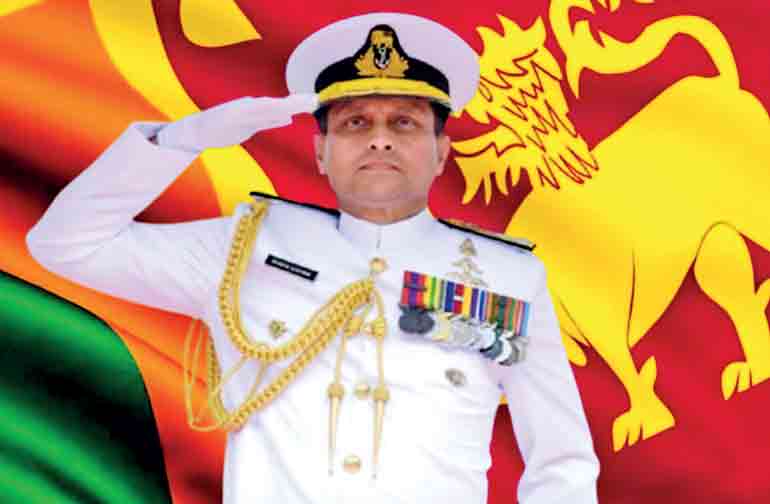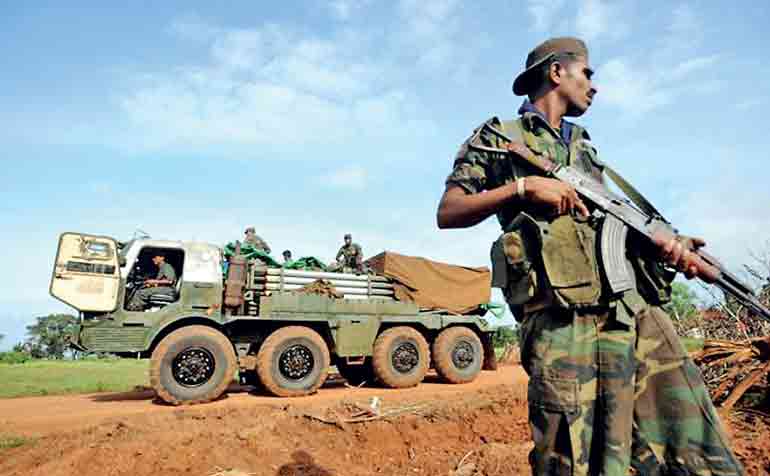Monday Feb 16, 2026
Monday Feb 16, 2026
Tuesday, 12 August 2025 00:20 - - {{hitsCtrl.values.hits}}

Former Navy Commander Nishantha Ulugetenne
The arrest and pre-trial detention of Admiral (Retired) D.N.S. Ulugetenne, former Commander of the Sri Lanka Navy, marks a troubling chapter in Sri Lanka’s post-war political landscape. The decorated naval chief, who served at the peak of the country’s internal conflict, has been remanded without a conviction, without compelling evidence of absconding, and without clear legal justification, sparking renewed debate over how post-conflict societies should treat their military personnel.
The move has not only raised constitutional and procedural concerns domestically but also casts a harsh spotlight on the global inconsistencies in how nations address allegations of wartime conduct.
A military career built in a time of crisis
 Admiral Ulugetenne led the Navy during a critical period in Sri Lanka’s long and bloody civil war, which spanned from 1983 to 2009 and cost over 80,000 lives by most estimates. His leadership, particularly during operations to intercept arms shipments and maintain maritime security, was instrumental in tipping the balance of power in favour of the Sri Lankan state during the final phase of conflict.
Admiral Ulugetenne led the Navy during a critical period in Sri Lanka’s long and bloody civil war, which spanned from 1983 to 2009 and cost over 80,000 lives by most estimates. His leadership, particularly during operations to intercept arms shipments and maintain maritime security, was instrumental in tipping the balance of power in favour of the Sri Lankan state during the final phase of conflict.
He was not a political figure. His command decisions were made in a high-intensity combat environment, where rules of engagement were ambiguous and often ill-defined. Despite this, he earned commendations for professionalism and restraint, even in the face of asymmetric warfare.
Yet in 2025, he finds himself imprisoned before trial, absent any charge that would normally require detention under Sri Lankan law. Legal experts, including former magistrates and human rights lawyers, have raised concerns about due process and the erosion of legal norms.
“This looks more like an act of political expedience than a legitimate prosecution,” said one Colombo-based defence analyst who declined to be named due to the sensitivity of the case.
Global double standards: The UK and US cases
Internationally, the treatment of veterans facing war-related allegations has varied widely, with so called, leading democracies enacting robust protections for their armed forces.
In the United Kingdom, Parliament passed the Overseas Operations (Service Personnel and Veterans) Act 2021, often dubbed the “Overseas Operations Bill.” It introduced a five-year limitation period on war crime prosecutions, effectively shielding most British soldiers from retrospective legal action for conduct in Iraq, Afghanistan, and other foreign conflicts. The Act includes what the government described as a “triple lock” protection, covering consent requirements, time bars, and prosecutorial discretion.
Human rights groups have criticised the bill for undermining international humanitarian law. Yet successive UK governments have defended it as essential to “protect soldiers from vexatious and repeated claims.”
Meanwhile, under the Trump administration, the United States imposed sanctions on officials of the International Criminal Court (ICC) and withdrew cooperation entirely, citing politically motivated investigations targeting American troops and allies, particularly Israel.
“The message from Washington was unequivocal, American soldiers will not be subjected to global courts,” stated a legal officer from the ICC under anonymity.
British involvement in Sri Lanka’s war, then and now
The British Government’s recent calls for accountability in Sri Lanka contrast sharply with its own historical role in the island’s military build-up. During the 1980s, declassified documents reveal that Britain’s elite Special Air Service (SAS) provided training to Sri Lankan forces, particularly in counter-insurgency tactics developed in Northern Ireland.
Training, reportedly approved by Prime Minister Margaret Thatcher, was conducted covertly despite Indian objections. Former Indian Prime Minister Indira Gandhi had warned of escalating regional instability. A 1984 memo from the UK Foreign Office referenced Indian suspicions of British involvement in Sri Lanka’s internal conflict.
What the SAS did not include in their training curriculum, critics argue, was comprehensive instruction on the Geneva Conventions or evolving international norms regarding the treatment of non-combatants. The International Criminal Court, the institution now often cited in post-conflict human rights discourse, did not even exist until 2002.
This raises a fundamental question: can a nation, or its officers, be held accountable for violating rules they were never trained to understand, under legal frameworks that did not exist at the time?
It’s a striking irony: the Sri Lankan armed forces, once the pupil, the teacher none other than the UK’s elite Special Air Service (SAS), are now lambasting the pupil. The twist? The UK government is faulting them for failing a lesson that was never on the syllabus, respect for human rights in the chaos of war.
The UN, diaspora politics, and tactical sanctions
Sri Lanka’s armed forces have been the subject of multiple UN Human Rights Council (UNHRC) resolutions since 2009, largely driven by lobbying from Western nations and diaspora communities. In March 2021, the UK co-sponsored a resolution that led to targeted sanctions and asset freezes against Sri Lankan military officials accused, but not convicted, of war-time abuses.
Analysts suggest these moves are as much about electoral politics in the UK and Canada, home to large Tamil diaspora populations, as they are about international justice. “It’s not a coincidence that calls for accountability in Sri Lanka spike ahead of elections in key diaspora constituencies,” said a senior South Asian diplomat.

If veterans are treated as liabilities once the war is over, recruitment and morale within the security services will be undermined
In stark contrast, there has been little to no Western diplomatic action in response to allegations of mass civilian casualties in Gaza, where over 30,000 people, including women and children, have died since 2023, according to UN figures. Western states have largely stood behind Israel, framing criticism as disproportionate or anti-Semitic.
The broader implications for Sri Lanka
Sri Lanka is not alone in navigating post-war justice. But unlike the UK or US, it lacks the geopolitical clout to defy international institutions or control the global narrative.
The case of Admiral Ulugetenne is a litmus test: not just for the rule of law, but for the future of civil-military relations in Sri Lanka. If veterans are treated as liabilities once the war is over, recruitment and morale within the security services will be undermined. This is particularly dangerous in a region still susceptible to geopolitical shifts, foreign interference, and domestic unrest.
Conclusion: A need for balance, not retribution
No country should be exempt from scrutiny. But justice must be even-handed, evidence-based, and grounded in law, not in retrospective morality or political expediency.
Admiral Ulugetenne, like many of his counterparts, did not create the war. He inherited it. He responded to the call of duty, under laws and doctrines shaped by the very nations now demanding his prosecution.
To jail him without trial is not accountability. It is an abandonment of sovereignty, and of those who once defended it.
(The writer is Chairman of International Consultants/Aficionado.)